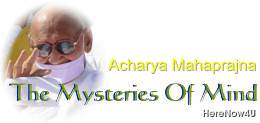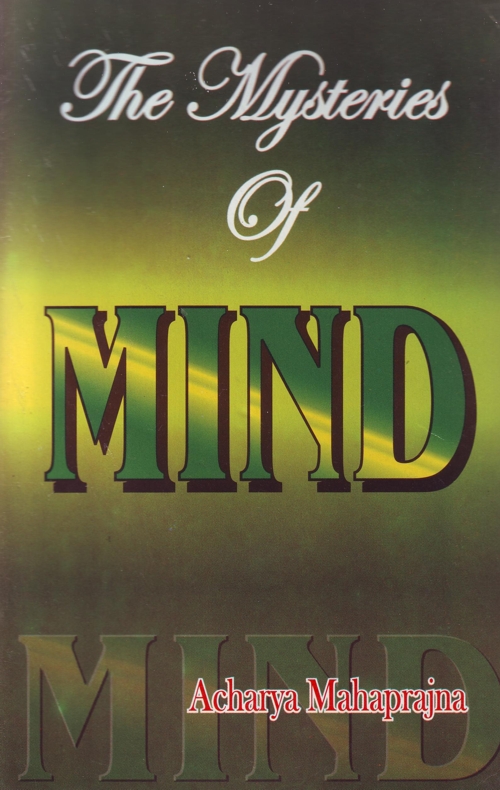
- The practice of Preksa meditation
-
- Activates the body.
- Activates consciousness centres.
- Develops the state of being a spectator.
- Establishes a closer contact with things and gives an opportunity to understand their internal structure.
- The practice of anupreksa (contemplation)
-
- Enables us to experience reality.
- Gives an opportunity to wipe out self-forgetfulness born of social relations and cleans the heart.
- Brings about the purity of heart.
- The practice of concentration
-
- Develops psychic powers.
- Develops psychic powers.
-
- The practice of lesya meditation
-
- Produces noble thoughts.
- Produces noble thoughts.
-
- A philosophy based on self-perception, purity of heart, synthesis and friendliness.
- Logical philosophy, controversies, struggle, victory, defeat.
- Means of comprehending gross reality and subtle reality, gross and subtle.
- The modern thinker relies on logic and arguments, which simply confuse the mind instead of leading it to truth.
The human personality has six traits. These have been conceived in the light of the theory of karma. They are:
- Geographical traits acquired from the geographical environment.
- Hereditary traits.
- Social traits.
- Physical traits.
- Psychological traits.
- Para-psychological traits.
Geographical environment plays an important role in the formation of the human personality. Different geographical environments give different characteristics to it. We can infer the geographical environment, in which a person has been born and brought up from the colour of his skin, the ways of his living, his dress, etc.
We inherit the characteristics of our parents. An offspring is the reproduction of its parents. It inherits three parts of its body from the mother and three parts from its father. An offspring of human parents will be a human being only and not an elephant. This is due to heredity. The form, muscles, bones, brain, etc. of a human being are inherited from its parents. They are heredity. This is the hereditary personality.
The third category, of traits is social traits. It is society, which plays a part in the formation of human personality. No human being will be a human being if he or she was not born and if he or she did not live in a human society. Human communication is determined by social conventions. It will not be possible unless man lived in a society. The entire give-and-take of human life is a social give and take. In a sense man is the totality of social relations. His dress and manners, and his thoughts and behaviour are determined by the social atmosphere.
The fourth category of the traits of the human personality is the physical traits, which include his physical needs and constitution. The limitations of our body impose limitations on our personality. The fifth category comprises of the psychological, traits. The psychic personality bears the burden of all the other aspects of our personality. It carries responsibilities and reacts to internal and external situation. It is the psyche, which makes us active. It holds beliefs and opinions. It forms its principles and attitudes. It decides what is to be avoided. Man is governed by his psyche. These five aspects of the human personality are self-evident and can be easily understood and appreciated.
The sixth category of the traits of the human personality are para-psychological traits. They belong to the unconscious part of his personality totally hidden in darkness. It is unmanifested. Anyhow, it controls and even guides the other five aspects of his personality. It is so powerful as to resist all kinds of influences on the mind. It is the most creative as well as destructive force in the universe. It guides all the activities of man and remains hidden in their background.
The discovery of the unconscious was the most revolutionary discovery. According to it whatever happens on the conscious stratum of the mind has its roots in the unconscious. This discovery added new dimensions to our thinking about the world and ourselves. Formerly it was believed that whatever happened in the conscious part of the mind and in the human body was caused by mental and physical causes only. The psychoanalysts, on the other hand, presented a different picture of the world. They maintained that our suppressed desires manifested themselves in the form of dreams as well as phenomena of which we are conscious.
There are two strata of the mind, the conscious and the unconscious. The unconscious is the most powerful force. It is the source of all our activities. Centuries earlier the theory of karma had propounded that karma is the source of all our activities. It is karma, which controls and guides us. When karma accumulated in the past becomes mature in us, it produces various effects. The entire personality of man is governed and determined by karma. What the psychoanalysts call the manifestation of suppressed desires is called karma vipaka according to the theory of karma. Both the ideas are almost identical.
The subtle body or karma body or subtle consciousness is the base and cause of all that happens in our conscious life. We may call it the super-psyche or para-psyche. It is not possible to explain any event in our life without reference to the para-psychic state. Karma is related to the parapsyche. Some persons are influenced by their environment; others who live in the same environment are the least affected by it. How are we to explain this difference? An explanation based on physical factors only will not be satisfactory. The real explanation lies in the parapsyche. The same thing holds good about heredity. The doctrine of heredity also is not a completely satisfactory doctrine. There are things in the life of man, which cannot be satisfactory explained in terms of physical, social and mental factors. It is the parapsyche, which holds the secret of life. We consciously desire to meditate but the unconscious tendencies not only give a setback to meditation, they even destroy it. They induct in the mind states, which are totally opposed to meditation. Things, which we had never desired, come to happen. A normally decent and rational man begins to behave in a way, which is opposed to all social norms. It is very difficult to explain the abnormal behaviour of such another wise rational and socially respectable man. The cause of such behaviour lies in the past, in the unconscious. The unconscious is the infinite storehouse of the entire past of mankind. So far as this grim unconscious stalks behind us, we cannot attain the state of samayika. It is only when this ghost of the past has been exorcised that we will be able to live a truly free life, otherwise it will always remain a life of bondage.
 Acharya Mahaprajna
Acharya Mahaprajna

